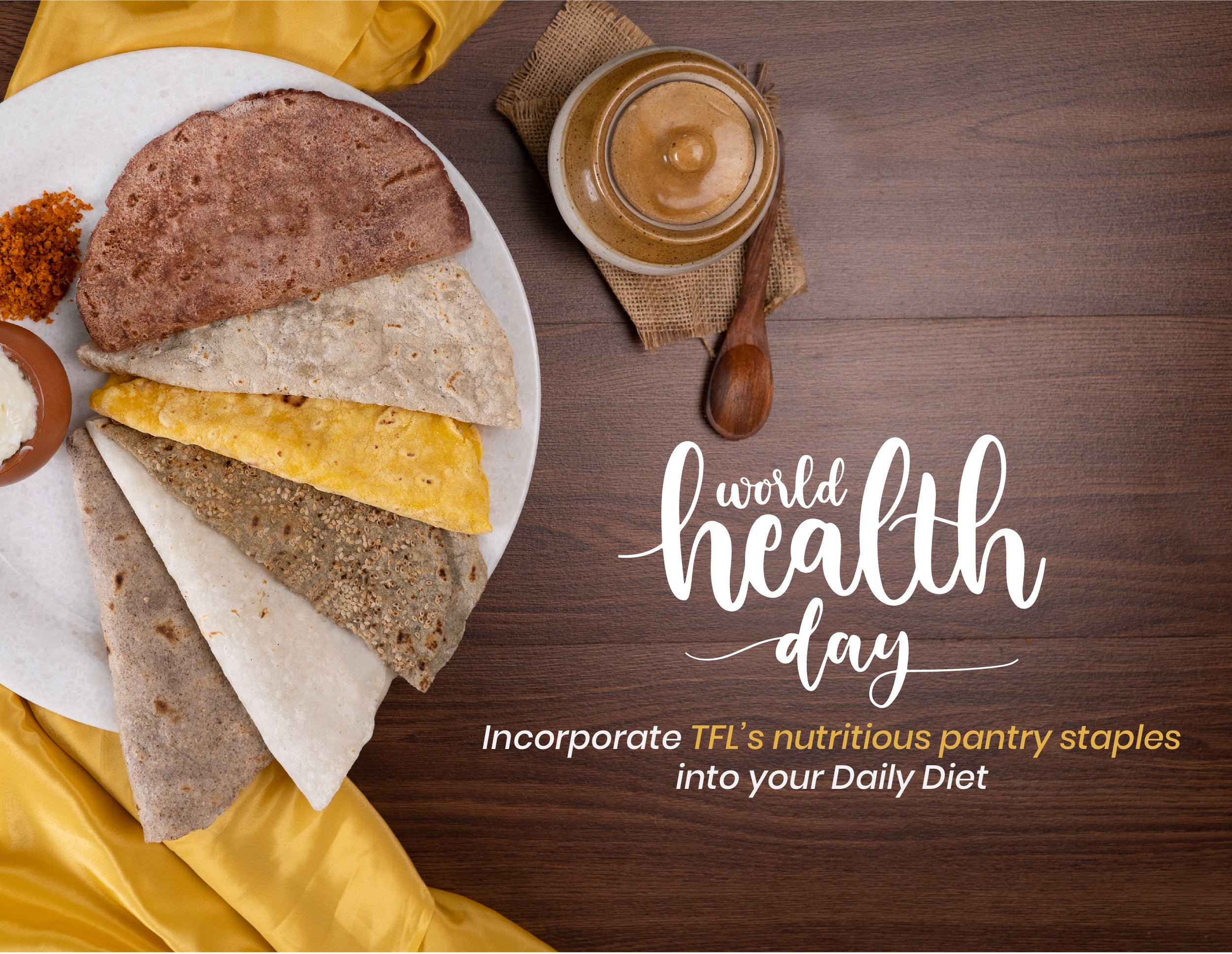Why Maintaining a Healthy Diet Should be Your Priority: A Reflection on World Health Day

What are your thoughts on uncleaned parks and garbage full of public transport?
What do you think about a messy home?
Would you like to work in a littered office space?
If the above questions make you raise your eyebrows, then I would like to ask you one question!
Will you be able to live in an ailing and unhealthy body?
If the answer is NO, then why are we subjecting our bodies to unhealthy eating habits?
Eating healthy is all about eating a balanced and nutritious diet, which we all know but “maintaining healthy food habits” is a bit of a task in our fast-moving life.
World health day is celebrated on the 7th of April every year. It is an initiative taken by the World Health Organisation(WHO) to raise awareness about the overall health and well-being of people across the world. On the occasion of World Health Day, let us take a pledge to make healthy eating choices for ourselves and our entire families.
Our body needs six essential nutrients like carbohydrates, proteins, fats, vitamins, minerals, and water to work properly.
Proteins: We need protein in our body to repair cells and make new ones.
Meat, egg & fish are good sources of protein & other plant-based sources such as grains, beans, soy & nuts.
Carbohydrates: Complex Carbohydrates are essential to meet the energy needs of our body.
Whole wheat grain and Millet are some of the great sources to incorporate these complex carbs in our diet.
Fats: Healthy fats are important as they support vitamins and mineral absorption in our body, help muscle movement, and build cells.
Some of the healthy fats include nuts, flaxseed, and some vegetable oil
Vitamins: There are a total of 13 vitamins that support proper body functions. Vitamin deficiency can cause disease and health problems.
A variety of vegetables and food are good sources of vitamins.
Minerals: Some of the common minerals are iron, calcium, and zinc. They are required for regulating metabolism, immunity, and building strong bones and teeth.
Milk and dairy products, fruits and vegetables, fish, and meat are some of the good sources of minerals to include in the diet.
Water: It is often neglected but very important for smooth functioning & hydrating our body, it flushes toxins out of our body.
Cucumbers, Watermelon are some of the great sources.
We must ensure that our diet should consist of these important nutrients. However, maintaining a healthy diet does not always have to be expensive.
Meal planning is a great way to ensure that we are maintaining good food habits!
Following is an example of a meal plan for a day, so you can prepare for a week accordingly.
(portions might change from person to person)
Breakfast: Our first food of the day is supposed to energize us for the rest of the day. Generally, Breakfast should be loaded with high-fiber, protein & carbohydrate-rich food.
Dietary fiber helps to maintain healthy bowel movements, carbohydrates provide energy to the body & uplift mood, and Protein reduces cravings.
So, what can you eat for breakfast?
Start your day with a glass of warm water
Fuel yourself with the Combination of one whole wheat paratha with one small bowl of fruits in the morning
Or
Bowl of Masala Upma
Nutritional paratha can be prepared using Taste for Life’s Nutri paratha atta, which consists of the goodness of Wheat, Soybean, Chana dal, and Methi. Just add vegetables of your choice and knead dough to make it healthier.Approx.100 gm of Nutri atta provides 366.2 kcal of energy,67.3 gm of carbohydrates, and 16.2 gm of proteins.
Lunch: Every night we all wonder what sabzi to cook for lunch the next day! However, Lunch is usually eaten at work & we normally carry Roti and Sabji in our lunch boxes. Instead of thinking a lot about what sabzi to cook, one can add a twist to a regular roti by using TFL’s Multigrain, soybean, Ragi, or Methi enriched wheat atta and Khapli wheat atta for balancing health and test.
What to include in Lunch?
A Bowl of salad, Bowl of Sabzi/Curd with two Multigrain Rotis
Diabetic people can replace regular roti with TFL’s Khapli atta roti which helps to manage blood sugar spikes after a meal
It’s a common misconception that multigrain rotis generally turn dry after a few hours but we recommend using TFL’s Multigrain wheat atta which absorbs more water and chapati stay soft for more than 8 hrs. Moreover, TFL’s Multigrain wheat atta is packed with 363 kcal of energy,72 gm of carbohydrates, and 13.6 gm of proteins. (per 100 gm serving)
Dinner:
Dinner is the last meal of the day. It should be light and satiating at the same time.
What to eat for dinner?
TFL’s Millet/Multigrain Dosa with coconut chutney
Or A Bowl of Moong dal khichdi
Or Millet bhakri with Dal
After a hectic day, cooking dinner may seem like a task that you would rather avoid.
TFL’s light dinner readymix range consists of healthy recipes like Handvo, Millet/Multigrain dosa, and Thalipeeth readymix which you can prepare in just 10-15 min and the important thing is it does not contain any artificial color or preservative!
Quick Tip:
*Ensure that you consume Millet at least once a day! bhakri is one of the common ways! Jowar or Bajra Bhakri keeps us satiated for a longer time which prevents us from mindless eating. One can opt for TFL’s bhakri atta range which is full of essential nutrients and unique as it promises easy rolling of bhakri.
Do’s and Don’ts to keep your health on track:
-Drink Plenty of water
-Take small walks
-Meditate
-Get enough sleep
-Avoid drinking alcohol
-Don’t skip meals
Last but not the least, don’t forget to add up on TFL’s nutritious pantry staples in your monthly grocery shopping.
Happy World Health Day!
